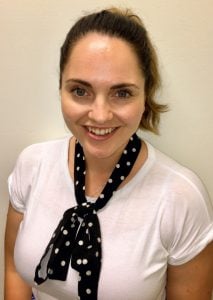Have you ever wondered how RANZCOG goes about decision-making? With this series, we hope to shed some light on our governance processes and, most importantly, the individuals behind them.
First things first: RANZCOG is governed by a seven-member Board who are the directors of the College. The Board manages the financial, legal and business operations of the organisation and is supported in its activities by the Council and a range of committees. In turn, the RANZCOG Council has general oversight of the policy and strategic planning of the College and meets three times a year (generally in March, July and November) at College House in Melbourne, Australia.
The functions and activities of the RANZCOG Board and Council are supported by approximately 50 committees and working parties (PDF), which meet regularly and make recommendations to the RANZCOG Board on a range of matters pertaining to women’s health.
Dr Trish Vosdoganes – Trainees Committee Chair
Trish Vosdoganes became a FRANZCOG trainee in 2014. In this piece, she talks about her journey.

Dr Trish Vosdoganes
What drew you to specialise in women’s health?
I was going to be a paediatrician. That was always the plan. In fact, I did a PhD in perinatal medicine in preparation for that. My supervisor, Prof Euan Wallace, was sure I was going to end up in obstetrics and we often joked that I’d prove him wrong. So I applied to the college of paediatricians but when I didn’t get an interview I decided to do a year of O&G instead. I loved it.
What have been your biggest challenges as a trainee?
During my training, I could see that bullying was still a major problem for the medical profession. I saw it across disciplines and within O&G. I think it’s becoming less tolerated and people are speaking up more, which is fantastic because it’s the only way we can change culture. This is an issue which has affected and challenged me personally, and in seeing my peers affected, and something I have become focused on advocating against. The Training Support Unit is doing a fantastic job in this space, and with the THRIVE workshops and the college’s growing focus on trainee mental health, I think we will start to see big changes.
By far my biggest challenge though has been balancing being a doctor in training, and being a mum. When I gave birth to my son, I took six months off and then came back part-time job sharing for six months. Job sharing can be a great opportunity for parents returning to work, but it’s unfortunately not an option supported by many workplaces. I hope with growing appreciation for gender equality and supporting parents in the workplace, this will become more available.
Returning to full time training was a shock to the system. I have an incredibly supportive partner and family, which made all the difference, but it’s hard. You feel like you are a half-parent. You feel like you’re letting your children down. My son really doesn’t see me on weekdays and he notices. As a registrar it’s tough because you’ve got no control. You’re a slave to shift work and HR departments, plus you’re trying to study and pass all your hurdle requirements. Thank God for Netflix and Uber-eats that keep my family alive and sane.
What keeps you going?
Knowing that I made a difference in my patients’ lives. You just can’t get past an honest ‘thank you’ when a woman with a difficult case goes home with a live baby. It doesn’t get better than that.
I love the pace of this career, love the challenges and the opportunity to work with amazing women and their families. It’s really the only specialty where you get such diversity in your practice. Every day is different!
How did you become involved with College governance?
I wanted to get to know the College more because I really didn’t have much of an idea of what it did, how it ran and how we could contribute. I started as one of the Victoria Trainee Representatives. After being involved in different committees, I thought, ‘I might as well go for Chair of the Trainees’ Committee, why not?’
Being Chair has been such a great opportunity. I’ve got to know my fellow trainee representatives from other states and we’ve compared notes about how things are done in each region and how we can do better. I think that’s really valuable because we can learn so much from each other and help to improve training all over Australia and New Zealand by creating networks. I’ve also got to know the Presidents and been able to tell them what matters to trainees; be a voice for the trainees – that’s why I’m here. In the long term, I’d like to stay involved with the College and in training supervision.
What would you like to achieve with your work?
My priority is in caring for my patients, but I’m also really passionate about changing the systems which restrict that care. I would love to see a future where hospitals are funded to provide excellence in both service and training; where equality in learning is available no matter where your training is located; and where the wellbeing of our doctors is a priority. I would also love to see the networks between our O&G community strengthened – where the hospital you have trained through doesn’t define you, but that you are a part of a team of health professionals fighting to improve the lives of women in Australia. That would be wonderful.
What advice would you give fellow trainees in O&G?
Life had a different plan to what I thought I did. O&G is an awesome specialty. It has shaped me as a person, but you need to be willing to work incredibly hard. We can go from a really quiet, simple day to all hell breaking lose in a moment. You need guts of steel to do this job. But we also need to understand our limitations, reach out for help when it is overwhelming us, and be kind to our colleagues, and ourselves, when we need a moment to heal.
If you’re keen to be involved with RANZCOG, then get involved! Don’t just expect the College to provide everything you need if you’re not willing to give back. The College can’t change and grow if it doesn’t hear from us. There’s no point in being overwhelmed and saying culture is too hard to change. We all have a role to play and one person can make the whole difference.
Lead by example. You want better gender equity opportunities? Then speak up. You want changes in our training and more exposure to operating? Stand up and create that change. Every trainee has a voice that has the power to the change the future.



